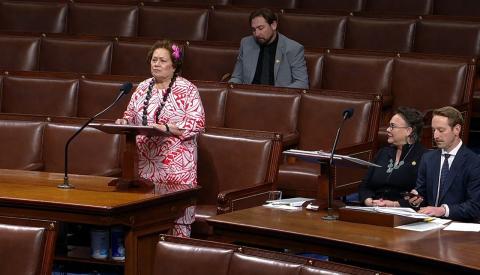House Passes Amata’s South Pacific Tuna Treaty Act
Washington, D.C. – Congresswoman Uifa’atali Amata is welcoming bipartisan passage by the U.S. House of Representatives of a bill she led as sponsor, with Congressman Ed Case (D-HI) as the original cosponsor, the South Pacific Tuna Treaty Act, H.R. 1792.
Video of Congresswoman Amata’s House floor statement on her bill is available HERE.
H.R. 1792 is bipartisan congressional direction of full implementation for the South Pacific Tuna Treaty, which has already been diplomatically negotiated among the U.S. and Pacific nations, and legislation is expected to be considered by the U.S. Senate.

Amata speaking on House floor for passage of her South Pacific Tuna Treaty Act
“As the representative of the beautiful islands of American Samoa in the South Pacific, a marine economy which depends on fishing, I welcome broad support in Congress for implementing our treaty with our regional friends and neighbors in the South Pacific,” said Congresswoman Amata. “This bill implements U.S. international diplomacy to help ensure that our tuna agreements improve operations and flexibility for our fleet – America’s last true distant water fishing fleet. I appreciate working with Chairman Bruce Westerman, Ranking Member Grijalva, and Congressman Case on this priority.”
Natural Resources Committee Chairman Bruce Westerman (R-Ark.) said, “H.R. 1792 enhances the effectiveness, clarity, and enforceability of the South Pacific Tuna Treaty of 1988, addressing concerns and improving the regulatory framework governing fishing activities between the United States and the PIPs. This bipartisan, commonsense bill will give more flexibility to the U.S. fishing industry and benefit all Americans. Representative Radewagen is no stranger to these issues given American Samoa’s abundant fishing resources, and I’d like to thank her for her leadership and the strong relationship she brings from the Pacific.”
The bill amends the South Pacific Tuna Treaty Act of 1988 to reflect the amendments to the Treaty adopted in 2016. In 2022, the Senate provided overwhelming bipartisan support for advice and consent to ratification, and this bill would complete this longstanding effort, moving into statute what has been operating under a Memorandum of Understanding, and resolving restrictions. The Treaty stabilizes high seas fishing days and codifies access to various island nations’ EEZ waters.
The bill was passed by the Natural Resources Committee in October. Prior to that, in July, the bill was examined in a legislative hearing by the Subcommitteeon Water, Wildlife and Fisheries, on which Amata serves, which heard expert testimony including from William Gibbons-Fly, Executive Director, American Tunaboat Association, who emphasized the last true “distant water fishing fleet” under the U.S. flag operating from Pago Pago Harbor, as “multi-generational, family-owned businesses with a long and storied history as an important part of the U.S. fishing industry.”
Expert testimony noted that the U.S. tuna purse seine fleet has been reduced in a few years time from 34 vessels to 13 vessels, due to numerous severe economic challenges from increased regulation, reduced access, and more competition especially from Illegal, Unreported and Unregulated (IUU) fishing.
Congresswoman Aumua Amata Radewagen’s remarks on the floor of the House of Representatives:
Talofa lava, good afternoon,
I rise today in support of HR 1792, the South Pacific Tuna Treaty Act, which I introduced along with original Co-sponsor Ed Case of Hawaii.
As representatives of the beautiful islands of American Samoa in the South Pacific, a marine economy which depends on a fishing economy like Hawaii, I applaud our Oceans Subcommittee Chairman Cliff Bentz of Oregon and Ranking Member Jared Huffman of California for their bipartisan support implementing this treaty with my friends and neighbors in the South Pacific.
This bill implements into statute the most recent changes to the South Pacific Tuna Treaty, that was negotiated between NOAA and other signatory countries to the Treaty.
These changes are important to support the American fishing fleet in the South Pacific –where many boats call the port in American Samoa home.
These changes improve the operation conditions and flexibility for the fleet – which is America’s last true distant water fishing fleet.
The 1987 treaty enables American tuna purse-seine vessels to fish in the exclusive economic zones of 16 Pacific Island nations and is key to the ongoing operations of America’s South Pacific tuna fleet including the 11 purse seiners based in American Samoa.
In 2016, the treaty signatories agreed to several amendments to the treaty. However, those changes have not yet been reflected in U.S. law, leaving South Pacific tuna fishermen in a state of uncertainty for years.
HR 1792 will fix these issues.
I also want to thank U.S. Deputy Assistant Secretary for International Fisheries Kelly Kryc and American Tunaboat Association Executive Director William Gibbons-Fly who testified in support of the bill at last July’s hearing.
Finally, I thank Chairman Westerman and Ranking Member Grijalva who guided the Natural Resources Committee to unanimously approving HR 1792 at last October’s markup.
Thank you. Soifua ma ia manuia.
###